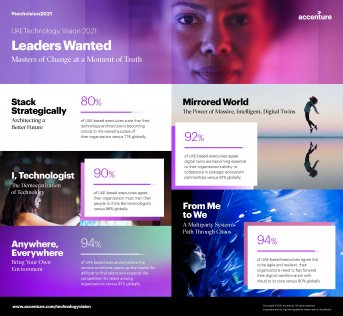ABU DHABI; Mar. 16, 2021: According to the Accenture Technology Vision 2021, technology was a lifeline during the global pandemic – enabling new ways of working and doing business, creating new interactions and experiences, and improving health and safety. Technology forever changed expectations and behaviors and created entirely new realities across every industry. As companies shift from reacting to the crisis to reinventing what comes next, the boldest, most visionary leaders – those who use technology to master change – will define the future, says the 21st annual report from Accenture, predicting the key technology trends that will shape businesses and industries over the next three years.
The report, “LeadersWanted: Masters of Change at a Moment of Truth,” outlines how leading enterprises are compressing a decade of digital transformation into one or two years. According to Accenture research, relying on a strong digital core to adapt and innovate at lightning speed, leaders are growing revenues 5x faster than laggards today, versus only 2x faster between 2015 to 2018. The result is a wave of companies racing to reinvent themselves and use technology innovations to shape the new realities they face.

Accenture surveyed more than 6,200 business and technology leaders from 27 countries, including the UAE, for the Technology Vision report. Globally, 92% report that their organisation is innovating with urgency and call to action this year, while in the UAE, the sense of urgency is even higher at 96%. And while 91% of global executives agree that capturing tomorrow’s market will require their organisation to define it – in the UAE, it’s a solid five points higher, amounting to 96%.
“Here in the UAE, technology is being used to build a better future. Eighty percent of UAE executives vs. 77% of global respondents believe that their technology architecture is becoming critical to the overall success of their organisation”, said David Deschamps, who leads Accenture Technology in the Middle East. “Adding to that, a solid majority – 90% of sampled UAE executives – affirm that their organisation’s business and technology strategies are becoming inseparable, even indistinguishable, while only 83% of the global sample agree. The UAE is embracing technology-based disruption, fast-tracking changes to digital infrastructure to accommodate the post-COVID economy”.
Paul Daugherty, group chief executive – Technology and chief technology officer at Accenture, said “The global pandemic pushed a giant fast forward button to the future. Many organisations stepped up to use technology in extraordinary ways to keep their businesses and communities running – at a pace they thought previously impossible – while others faced the stark reality of their shortcomings, lacking the digital foundation needed to rapidly pivot. We now have a once-in-a-generation opportunity to turn this moment of truth for technology into a moment of trust — embracing the power of exponential technology change to completely reimagine and rebuild the future of business and human experience”.
Shaping the future will require companies to become masters of change by adhering to three key imperatives. First, leadership demands technology leadership. The era of the fast follower is over—perpetual change is permanent. Tomorrow’s leaders will be those that put technology at the forefront of their business strategy. Second, leaders won’t wait for a new normal. They’ll reinvent, building new realities using radically different mindsets and models. Finally, leaders will embrace a broader responsibility as global citizens, deliberately designing and applying technology to create positive impacts far beyond the enterprise to create a more sustainable and inclusive world.
The Technology Vision identifies five key trends that companies will need to address over the next three years to accelerate and master change in all parts of their business:
- Stack Strategically: Architecting a Better Future – A new era of industry competition is dawning – one where companies compete on their IT systems architecture. But building and wielding the most competitive technology stack means thinking about technology differently, making business and technology strategies indistinguishable.
- Mirrored World: The Power of Massive, Intelligent, Digital Twins – Leaders are building intelligent digital twins to create living models of factories, supply chains, product lifecycles, and more. Bringing together data and intelligence to represent the physical world in a digital space will unlock new opportunities to operate, collaborate, and innovate. In the UAE, 92% agree digital twins are becoming essential to their organisation’s ability to collaborate in strategic ecosystem partnerships. Moreover, 86% believe their organisation requires a mission control, or central intelligence hub, to gain insights into complexities and model their organisation’s processes, people, and assets.
- I, Technologist: The Democratisation of Technology – Powerful capabilities are now available to people across business functions, adding a grassroots layer to enterprises’ innovation strategies. Now, every employee can be an innovator, optimise their work, fix pain points, and keep the business in lockstep with new and changing needs.
- Anywhere, Everywhere: Bring Your Own Environment – The single biggest workforce shift in living memory has positioned businesses to expand the enterprise’s boundaries. When people can bring their own environment, they have the freedom to seamlessly work from anywhere – whether that’s at home, the office, the airport, partners’ offices, or somewhere else. In this model, leaders can rethink the purpose of working at each location and lean into the opportunity to reimagine their business in this new world.
- From Me to We: A Multiparty System’s Path Through Chaos – The demand for contact tracing, frictionless payments, and new ways of building trust brought into sharp focus what had been left undone with enterprises’ existing ecosystems. Multiparty systems can help businesses gain greater resilience and adaptability, unlock new ways to approach the market, and set new ecosystem-forward standards for their industries. Globally, 20% of executives are experimenting with multiparty systems, compared to 36% of UAE executives – 16 points higher than their global counterparts in experimenting with Multiparty Systems this year. Moreover, 94% of UAE executives vs. 90% globally agree that to be agile and resilient, their organisations need to fast forward their digital transformation with cloud at its core.
Prioritising technology innovation in response to a rapidly changing world has never been more important. Consider the restaurant industry: 60% of restaurants listed as ‘temporarily closed’ on Yelp in July were permanently out of business by September. Through the chaos, Starbucks emerged as a leader, using technology to expand customer and retail channels. By August, three million new users downloaded its app, and mobile ordering and drive-thru pick-up accounted for 90% of sales. As demand surged, it deployed an integrated ticket management system to combine orders from its app, Uber Eats, and drive-thru customers into a single workflow for baristas. Starbucks also introduced a new espresso machine with sensors to track how much coffee was being poured and predict necessary maintenance. This is a powerful illustration of technology as the core enabler of a company’s agile, resilient and successful response to change.





